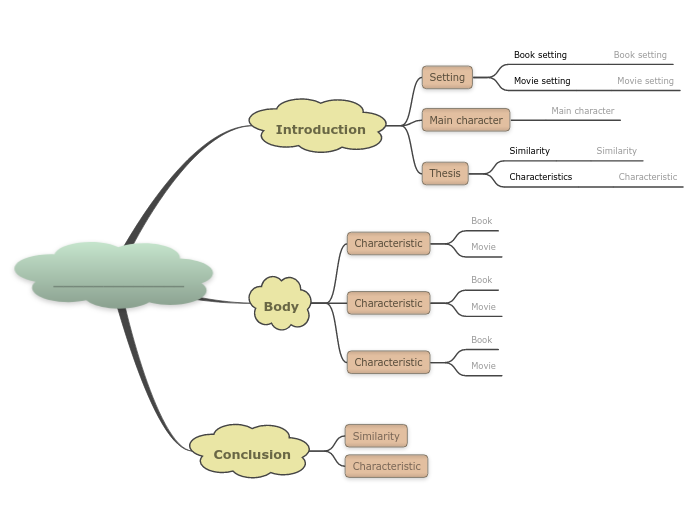Movie vs Book template
Use the 'Point-to-Point' strategy while systematically comparing and contrasting two subjects.
Keywords: literature, writing


Plus de détails
Use this 'compare and contrast - movie and book' template to figure out what are the similarities and differences between a book and a movie you are analyzing.
Comparing the book with the movie version will help you understand the differences between settings, main characters, thesis, etc.
Point-to-point compare and contrast analysis can be used for comparing and contrasting other subjects too.
Type in the name of the novel and movie you are going to compare and contrast.
Example: Great Expectations.
Restate your thesis while avoiding repetition.
Restate the differences between the book and the movie.
Restate the similarities between the novel and the movie, but try to avoid repetition (this will help if you write an essay afterward).
Use point-by-point organization in the body section to present the characteristics briefly stated in the thesis.
This means that if you use this draft to write a compare and contrast paper, each characteristic will be introduced in a separate paragraph.
How is the movie different from the novel?
Type in a short explanation. Use 'like', 'same as' or 'similar' for comparison, and 'unlike', 'differ from' and 'although' for contrasting.
How is the novel different from the movie?
Type in the answer. Use 'like', 'same as' or 'similar' for comparison, and 'unlike', 'differ from' and 'although' for contrasting.
The introduction provides background information for both the book and the movie.
Create a thesis statement in which you briefly compare and contrast the book and the movie.
Characteristic
Which are the differences between the book and the movie?
Think of at least 3 differences. Type them in.
Examples regarding Great Expectations
Which are the similarities between the book and the movie?
Type them in. Example: Great Expectations the book and the movie have very similar plots.
Type in the name of the main character.
This has to be the same for both the book and the movie.
Is the action in the movie set in the same place?
Where is it set? Example: The action in Great Expectations (1946) by David Lean has the same setting as in the book.
In the book, where does the action take place?
Example: The action in Great Expectations the book takes place in 19th century England, London and Kent.
Les cartes mentales vous aident à faire un brainstorming, à établir des relations entre les concepts, à organiser et à générer des idées.
Cependant, les modèles de cartes mentales offrent un moyen plus facile de commencer, car il s'agit de cadres qui contiennent des informations sur un sujet spécifique avec des instructions d'orientation. Par essence, les modèles de cartes mentales assurent la structure qui combine tous les éléments d'un sujet spécifique et servent de point de départ à votre carte mentale personnelle. Ils constituent une ressource qui offre une solution pratique pour créer une carte heuristique sur un sujet particulier, que ce soit dans le domaine des affaires ou de l'éducation.
Mindomo vous propose des modèles de cartes mentales intelligentes qui vous permettent de fonctionner et de penser sans effort.
Thèmes descriptifs
Sujets avec texte d'arrière-plan
Branche par défaut
Suppression des données du modèle
Vous pouvez choisir parmi une variété de cartes mentales vierges provenant des comptes professionnels ou éducatifs de Mindomo, ou vous pouvez créer vos propres modèles de cartes heuristiques à partir de zéro. Toute carte heuristique peut être transformée en modèle de carte heuristique en ajoutant des notes d'orientation à l'un de ses sujets.